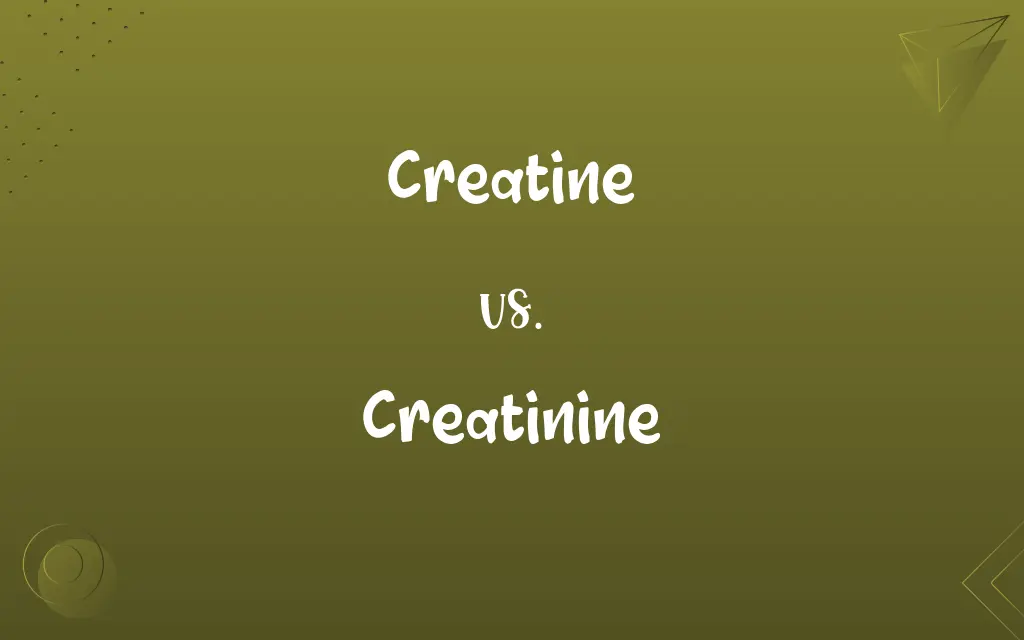Creatine vs. Creatinine: Know the Difference

By Shumaila Saeed & Hifza Nasir || Published on August 26, 2024
Creatine is a compound that supports energy production in muscles, while creatinine is a waste product formed from the metabolism of creatine, measured in the urine to assess kidney function.

Key Differences
Creatine is a naturally occurring amino acid derivative found in muscle cells, helping to produce ATP (adenosine triphosphate), which provides energy for muscle contractions. It is popularly used as a dietary supplement to enhance athletic performance and increase muscle mass. Creatinine, on the other hand, is a breakdown product of creatine phosphate in muscles, released into the bloodstream and excreted by the kidneys.
Hifza Nasir
Aug 26, 2024
The body produces creatine primarily in the liver and kidneys, and it's transported to the muscles for use. People also obtain creatine from dietary sources like meat and fish. Creatinine levels in the blood and urine are used by healthcare professionals as an indicator of kidney function, with high levels potentially indicating impaired kidney function.
Hifza Nasir
Aug 26, 2024
Creatine supplementation is sought after by athletes and bodybuilders for its benefits in high-intensity training, creatinine serves no functional purpose in the body. Instead, its consistent production rate makes it useful for evaluating the filtering capacity of the kidneys.
Shumaila Saeed
Aug 26, 2024
The intake of creatine does not directly translate to increased creatinine levels, as the conversion rate is consistent and any excess creatine not used by muscles is naturally excreted. However, chronic high doses of creatine could potentially lead to an increased burden on the kidneys, indirectly affecting creatinine levels over time.
Shumaila Saeed
Aug 26, 2024
Understanding the distinction between creatine and creatinine is important for interpreting blood and urine test results accurately and for making informed decisions about creatine supplementation, especially for those with preexisting kidney conditions.
Hifza Nasir
Aug 26, 2024
ADVERTISEMENT
Comparison Chart
Definition
A compound that helps supply energy to muscles.
A waste product formed from the breakdown of creatine.
Hifza Nasir
Aug 26, 2024
Function
Supports energy production and muscle function.
Used to assess kidney function.
Shumaila Saeed
Aug 26, 2024
Source
Produced in the liver and kidneys, found in foods like meat and fish.
Produced from the metabolism of creatine in muscles.
Shumaila Saeed
Aug 26, 2024
Supplementation
Often taken by athletes to improve performance and muscle mass.
Not supplemented; monitored for kidney health.
Hifza Nasir
Aug 26, 2024
Clinical Use
Used to enhance athletic performance and muscle growth.
Blood and urine levels are measured to assess renal function.
Shumaila Saeed
Aug 26, 2024
ADVERTISEMENT
Impact on Health
Can improve exercise performance; excessive intake may impact kidney function in susceptible individuals.
Elevated levels can indicate kidney dysfunction or disease.
Shumaila Saeed
Aug 26, 2024
Creatine and Creatinine Definitions
Creatine
A natural substance that helps supply energy to muscle and nerve cells.
He added creatine supplements to his diet to boost his gym performance.
Shumaila Saeed
Feb 27, 2024
Creatinine
High levels in the blood may suggest kidney impairment.
The increased creatinine levels suggested his kidneys were not filtering waste efficiently.
Dua Fatima
Feb 27, 2024
Creatine
Found in meat and fish, it's also a popular dietary supplement.
As a vegetarian, she considered creatine supplements to compensate for dietary intake.
Shumaila Saeed
Feb 27, 2024
Creatinine
Measured via blood or urine tests.
She provided a urine sample for a creatinine clearance test.
Hifza Nasir
Feb 27, 2024
ADVERTISEMENT
Creatine
Its supplementation is generally considered safe for healthy individuals.
She consulted her doctor before starting creatine for weight training.
Hifza Nasir
Feb 27, 2024
Creatinine
Used as an indicator of kidney function in medical tests.
The doctor ordered a creatinine test to assess her renal function.
Shumaila Saeed
Feb 27, 2024
Creatine
Supports high-intensity training and muscle recovery.
Creatine helped him increase his workout intensity and speed up recovery.
Shumaila Saeed
Feb 27, 2024
Creatinine
Consistent production rate makes it a reliable marker for kidney health.
Because of its steady rate of production, creatinine levels are a good indicator of kidney health over time.
Hifza Nasir
Feb 27, 2024
Creatine
Can be produced synthetically for supplements.
The synthetic creatine powder is widely used by athletes for muscle growth.
Dua Fatima
Feb 27, 2024
Creatinine
A chemical waste molecule generated from muscle metabolism.
His routine blood test showed elevated creatinine levels, indicating a kidney check was needed.
Shumaila Saeed
Feb 27, 2024
Creatine
An amino acid that does not occur in proteins but is found in the muscle tissue of vertebrates both in the free form and as phosphocreatine; supplies energy for muscle contraction.
Shumaila Saeed
Feb 27, 2024
Creatinine
(biochemistry) A heterocyclic amine, 2-amino-1-methyl-5H-imidazol-4-one, formed by the metabolism of creatine.
Shumaila Saeed
Feb 27, 2024
Creatine
(amino acid) An amino acid, 2-(carbamimidoyl-methyl- amino)acetic acid, which naturally occurs in vertebrates and helps to supply energy to muscle and nerve cells.
Shumaila Saeed
Feb 27, 2024
Creatinine
A creatine anhydride, C4H7N3O, formed by the metabolism of creatine, that is found in muscle tissue and normally excreted in the urine as a metabolic waste.
Shumaila Saeed
Feb 27, 2024
Repeatedly Asked Queries
Can taking creatine supplements affect my creatinine levels?
While creatine supplementation doesn’t directly increase creatinine levels, excessive or long-term use could potentially affect kidney function, indirectly influencing creatinine levels.
Shumaila Saeed
Aug 26, 2024
How are creatinine levels tested?
Creatinine levels are tested through blood samples or urine tests to evaluate kidney function.
Shumaila Saeed
Aug 26, 2024
Is it safe to take creatine supplements?
Creatine supplements are generally safe for healthy individuals when taken in recommended amounts, but it’s advisable to consult a healthcare provider before starting.
Shumaila Saeed
Aug 26, 2024
What is the main difference between creatine and creatinine?
Creatine is a compound that supports muscle energy, while creatinine is a waste product from the metabolism of creatine, used to assess kidney function.
Hifza Nasir
Aug 26, 2024
What should I do if my creatinine levels are high?
High creatinine levels require medical evaluation to determine the underlying cause and appropriate treatment to address potential kidney issues.
Hifza Nasir
Aug 26, 2024
How can I monitor the effects of creatine supplementation on my kidneys?
Regular blood tests to monitor creatinine and kidney function can help assess how creatine supplementation affects your kidneys, especially if you have preexisting kidney conditions.
Dua Fatima
Aug 26, 2024
What could cause elevated creatinine levels?
Elevated creatinine levels can be caused by kidney dysfunction, dehydration, certain medications, and excessive intake of dietary protein, among other factors.
Hifza Nasir
Aug 26, 2024
Are there natural ways to reduce creatinine levels?
Staying hydrated, managing blood pressure, and avoiding excessive protein intake can help maintain healthy creatinine levels, along with treating underlying medical conditions.
Hifza Nasir
Aug 26, 2024
How does creatine improve athletic performance?
Creatine increases the availability of ATP in muscles, enhancing performance in high-intensity activities and supporting faster muscle recovery.
Shumaila Saeed
Aug 26, 2024
Can dietary changes affect creatinine levels?
While dietary changes alone are unlikely to significantly alter creatinine levels, maintaining hydration and a balanced diet can support overall kidney health.
Shumaila Saeed
Aug 26, 2024
Share this page
Link for your blog / website
HTML
Link to share via messenger
About Author
Written by
Shumaila SaeedShumaila Saeed, an expert content creator with 6 years of experience, specializes in distilling complex topics into easily digestible comparisons, shining a light on the nuances that both inform and educate readers with clarity and accuracy.
Co-written by
Hifza Nasir






































































